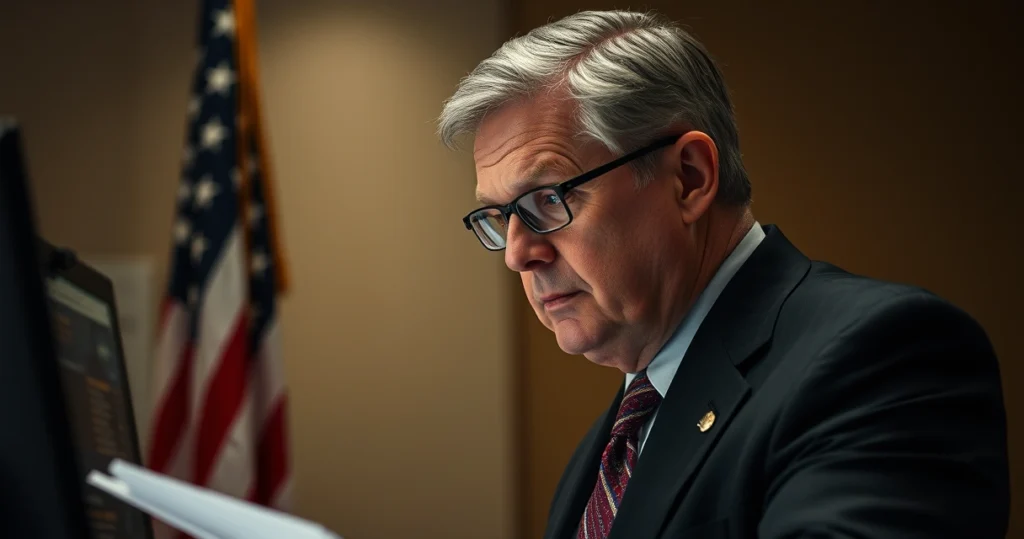Government Official Caught Hiding Citizen Comments: Is Digital Democracy Under Attack in America?
Introduction
The recent revelation of a government official allegedly hiding citizen comments has ignited a significant debate regarding the state of digital democracy in America. As technology becomes increasingly integrated into the political landscape, the implications of political censorship and the need for government transparency cannot be overlooked. This incident raises critical questions about government accountability and the role of public engagement in a democratic society. Is our digital democracy under attack, and how can citizens safeguard their right to freedom of speech?

Development Principal
The concept of digital democracy refers to the ways in which technology and digital platforms facilitate citizen participation in the political process. In an age where social media and online forums are primary venues for public discussion, the expectation is that government officials will actively engage with citizens. However, the incident involving the concealment of citizen comments highlights a disturbing trend of political censorship that threatens the very foundation of democratic values.
Political censorship can take many forms, from outright suppression of dissenting voices to more subtle methods such as ignoring or manipulating public feedback. In this scenario, the official’s actions can be seen as an attempt to control the narrative and limit citizen engagement, which is crucial for a functioning democracy. When government officials choose to overlook or hide public commentary, it undermines the trust that citizens place in their leaders and the political system as a whole.
Moreover, this situation raises questions about government transparency. Citizens have a fundamental right to access information about their government’s actions and decisions. Transparency not only fosters accountability but also empowers citizens to make informed decisions. The lack of transparency can lead to disillusionment among the populace and diminish civic engagement.
Digital platforms have the potential to enhance government transparency by providing real-time access to information and enabling direct communication between officials and citizens. However, when these platforms are manipulated or censored, the promise of digital democracy becomes compromised. This situation urges a reevaluation of how government officials interact with citizens in the digital age.
Analysis and Benefits
Analyzing the implications of hiding citizen comments reveals a broader pattern of behavior that can stifle democratic values. When officials disregard public input, they not only diminish the voices of constituents but also risk alienating them from the political process. This alienation can have long-lasting effects on voter turnout, public trust, and overall engagement in democracy.
One of the primary benefits of a transparent government is the enhancement of government accountability. When citizens are allowed to express their opinions freely, officials are held to a higher standard. Public engagement encourages leaders to be responsive to the needs and concerns of their constituents, fostering a healthier political environment. This responsiveness can lead to better policy decisions that reflect the interests of the community.
Furthermore, the fight for freedom of speech and the protection of citizen engagement are essential components of a thriving democracy. Policies that promote open dialogue and the sharing of diverse perspectives can strengthen the fabric of society. When citizens feel that their voices matter, they are more likely to participate in the political process, whether through voting, activism, or community organizing.
On the contrary, when censorship occurs, it can create a chilling effect, discouraging individuals from expressing their opinions for fear of retaliation or disregard. This deterrent can stifle innovation and hinder the progressive evolution of society. Hence, it is imperative that citizens remain vigilant and insist on their right to engage with their government openly.
Implementation Practice
To combat the threats posed by political censorship and to bolster digital democracy, several practical steps can be taken. First and foremost, citizens should advocate for policies that promote government transparency. This can include the implementation of laws that require public officials to disclose their communications with constituents and make public comments accessible for review.
Moreover, utilizing technology to enhance engagement can also be effective. Governments can adopt platforms that allow for public forums, online surveys, and feedback mechanisms that ensure citizen voices are heard and considered in decision-making processes. These platforms can serve as vital tools for fostering dialogue and building trust between officials and the community.
In addition, civic education plays a crucial role in empowering citizens. By providing individuals with the knowledge and skills to navigate the digital landscape, they can engage more effectively in discussions about public policy and governance. Educational initiatives can raise awareness of the importance of freedom of speech and the significance of participating in democratic processes.
Finally, it is essential for citizens to hold their leaders accountable. This can be achieved through advocacy, participation in town hall meetings, and leveraging social media to amplify their voices. Engaging with representatives and demanding transparency will help to ensure that officials remain responsive to the needs of the public.

Frequently Asked Questions
What is political censorship?
Political censorship refers to the suppression or restriction of information, opinions, or expressions that challenge or criticize government actions or policies. This can manifest in various forms, including the silencing of dissenting voices and the manipulation of public discourse.
Why is government transparency important?
Government transparency is vital because it promotes accountability, fosters public trust, and empowers citizens to make informed decisions. When officials operate transparently, it encourages active participation in the political process and strengthens democracy.
How does digital democracy differ from traditional democracy?
Digital democracy leverages technology and digital platforms to enhance citizen engagement and participation in governance. Unlike traditional democracy, which may rely on in-person meetings and paper-based communication, digital democracy allows for real-time interaction and broader access to information.
What role does citizen engagement play in democracy?
Citizen engagement is essential for a healthy democracy as it ensures that the voices of the public are heard in decision-making processes. Active participation from citizens leads to better representation, accountability, and ultimately, more effective governance.
How can citizens advocate for their rights in the digital space?
Citizens can advocate for their rights by demanding transparency from their government, participating in public forums, utilizing social media to express their opinions, and engaging in community organizing and activism. Staying informed and involved is key to preserving democratic values.
Conclusion
The incident involving the concealment of citizen comments by a government official underscores the ongoing challenges facing digital democracy in America. As political censorship rises, the need for government transparency and accountability becomes increasingly pressing. It is essential for citizens to remain vigilant and actively engage in the democratic process to safeguard their rights and ensure that their voices are heard. By advocating for transparency, utilizing technology for engagement, and holding officials accountable, citizens can help to protect the integrity of democracy and promote a more inclusive political environment.







